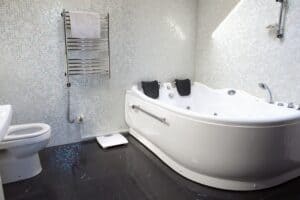How often should I resurface my countertops?
Countertops are an important part of any kitchen or bathroom, and they can be a significant investment. Over time, however, countertops can become worn, stained, or damaged, and may need to be resurfaced or replaced. But how often should you resurface your countertops, and when is the right time to do it? In this article, we’ll explore how often you should resurface your countertops and why it’s a great option for homeowners.
(Searching for “Los Angeles Countertop Resurfacing“? Contact us today!)
At JLF Tub & Tile Reglazing, we specialize in resurfacing countertops using a specialized process that involves sanding down the surface of your countertops and applying a new coating. This process can effectively restore the beauty of your countertops, remove stains, and fix minor damage. But how often should you resurface your countertops?
The frequency with which you should resurface your countertops depends on several factors, including the material of your countertops, the level of use they receive, and how well they are maintained. In general, however, most countertops should be resurfaced every 10-15 years, although this timeline can vary.
Some materials, such as granite and quartz, are more durable and resistant to damage than others, such as laminate or tile. If you have high-quality countertops made from materials like granite or quartz, you may be able to go longer without resurfacing them. On the other hand, if you have countertops made from more fragile materials, or if they receive a lot of wear and tear, you may need to resurface them more frequently.
Another factor to consider is how well your countertops are maintained. Regular cleaning and upkeep can help to extend the lifespan of your countertops and prevent damage from occurring. If you take good care of your countertops, you may be able to go longer between resurfacing them.
There are several signs that it may be time to resurface your countertops. These include:
- Stains or discoloration that cannot be removed with regular cleaning
- Scratches, chips, or other damage to the surface of the countertops
- An outdated or unattractive appearance
- Difficulty keeping the countertops clean or sanitary
If you notice any of these signs, it may be time to consider resurfacing your countertops. Resurfacing can help to restore the beauty of your countertops, remove stains and damage, and give your kitchen or bathroom a fresh, updated look.
One of the main benefits of resurfacing your countertops is that it’s a cost-effective alternative to replacing them altogether. Replacing countertops can be a significant investment, but resurfacing them can give you many of the same benefits at a fraction of the cost. Resurfacing is also a more environmentally friendly option, as it eliminates the need to dispose of your old countertops and reduces waste.
At JLF Tub & Tile Reglazing, we use a specialized process to resurface countertops, ensuring a high-quality finish that will last for years to come. Our team is dedicated to providing our clients with the best possible service and results, and we stand behind our work with a satisfaction guarantee.
In conclusion, resurfacing your countertops is a great option for homeowners who want to restore the beauty of their kitchen or bathroom without breaking the bank. The frequency with which you should resurface your countertops depends on several factors, but most countertops should be resurfaced every 10-15 years. If you’re considering resurfacing your countertops, be sure to choose a reputable company like JLF Tub & Tile Reglazing, to ensure that the process is done safely and effectively, resulting in beautiful, long-lasting countertops that will look great for years to come.
